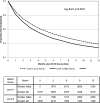Depressive affect and hospitalization risk in incident hemodialysis patients
- PMID: 25278546
- PMCID: PMC4186507
- DOI: 10.2215/CJN.01340214
Depressive affect and hospitalization risk in incident hemodialysis patients
Abstract
Background and objectives: Recent studies demonstrated an association between depressive affect and higher mortality risk in incident hemodialysis patients. This study sought to determine whether an association also exists with hospitalization risk.
Design, setting, participants, & measurements: All 8776 adult incident hemodialysis patients with Medical Outcomes Study Short Form 36 survey results treated in Fresenius Medical Care North America facilities in 2006 were followed for 1 year from the date of survey, and all hospitalization events lasting >24 hours were tracked. A depressive affect score was derived from responses to two Medical Outcomes Study Short Form 36 questions ("down in the dumps" and "downhearted and blue"). A high depressive affect score corresponded with an average response of "some of the time" or more frequent occurrence. Cox and Poisson models were constructed to determine associations of depressive affect scores with risk for time to first hospitalization and risk for hospitalization events, as well as total days spent in the hospital, respectively.
Results: Incident patients with high depressive affect score made up 41% of the cohort and had a median (interquartile range) hospitalization event rate of one (0, 3) and 4 (0, 15) total hospital days; the values for patients with low depressive affect scores were one (0, 2) event and 2 (0, 11) days, respectively. For high-scoring patients, the adjusted hazard ratio for first hospitalization was 1.12 (1.04, 1.20). When multiple hospital events were considered, the adjusted risk ratio was 1.13 (1.02, 1.25) and the corresponding risk ratio for total hospital days was 1.20 (1.07, 1.35). High depressive affect score was generally associated with lower physical and mental component scores, but these covariates were adjusted for in the models.
Conclusions: Depressive affect in incident hemodialysis patients was associated with higher risk of hospitalization and more hospital days. Future studies are needed to investigate the effect of therapeutic interventions to address depressive affect in this high-risk population.
Keywords: CKD; ESRD; depression; morbidity; quality of life.
Copyright © 2014 by the American Society of Nephrology.
Figures
Comment in
-
Lower physical activity and depression are associated with hospitalization and shorter survival in CKD.Clin J Am Soc Nephrol. 2014 Oct 7;9(10):1669-70. doi: 10.2215/CJN.08400814. Epub 2014 Oct 2. Clin J Am Soc Nephrol. 2014. PMID: 25278544 Free PMC article. No abstract available.
References
-
- Hedayati SS, Bosworth HB, Briley LP, Sloane RJ, Pieper CF, Kimmel PL, Szczech LA: Death or hospitalization of patients on chronic hemodialysis is associated with a physician-based diagnosis of depression. Kidney Int 74: 930–936, 2008 - PubMed
-
- Drayer RA, Piraino B, Reynolds CF, 3rd, Houck PR, Mazumdar S, Bernardini J, Shear MK, Rollman BL: Characteristics of depression in hemodialysis patients: Symptoms, quality of life and mortality risk. Gen Hosp Psychiatry 28: 306–312, 2006 - PubMed
-
- Kimmel PL, Peterson RA, Weihs KL, Simmens SJ, Alleyne S, Cruz I, Veis JH: Multiple measurements of depression predict mortality in a longitudinal study of chronic hemodialysis outpatients. Kidney Int 57: 2093–2098, 2000 - PubMed
-
- Lopes AA, Bragg J, Young E, Goodkin D, Mapes D, Combe C, Piera L, Held P, Gillespie B, Port FK, Dialysis Outcomes and Practice Patterns Study (DOPPS) : Depression as a predictor of mortality and hospitalization among hemodialysis patients in the United States and Europe. Kidney Int 62: 199–207, 2002 - PubMed
-
- Lacson E, Jr, Li NC, Guerra-Dean S, Lazarus M, Hakim R, Finkelstein FO: Depressive symptoms associate with high mortality risk and dialysis withdrawal in incident hemodialysis patients. Nephrol Dial Transplant 27: 2921–2928, 2012 - PubMed
Publication types
MeSH terms
LinkOut - more resources
Full Text Sources
Other Literature Sources
Medical


